Quad-Cities Artists, Venues and Patrons Gradually Return to Live Shows
Saturday In The Arts is a comprehensive weekly feature looking at a trend, personality, or major subject involving the Quad-Cities arts and entertainment scene.
When Davenport jazz pianist and singer Freddy Allen returned July 25 to perform at The Grape Life Wine Store & Lounge, it was the first time the former regular played there since Feb. 28.
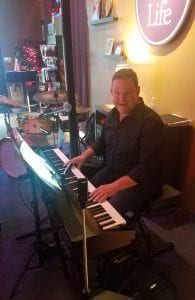
Freddy Allen at The Grape Life July 25.
It was a bittersweet occasion for the 50-year-old full-time musician, who has seen his livelihood decimated due to the raging Covid-19 crisis.
“It was emotional, it was hard,” Allen said recently. “I’ve been one of those people, during this entire pandemic, I have been nervous about everything. I had not been inside anywhere, any business, without a mask on. I had a knot in my stomach. It did go well; I felt pretty safe, once I got in there. I was the only person wearing a mask; I went straight to my stage, and when I started performing, took off my mask.”
Owners Diane and Kevin Koster at Grape Life “are very careful, asked everybody not to get too close to the musicians, and keep people safely distanced in the room,” he said. Allen had big concerns about singing, which is a greater virus risk indoors than speaking.
“I want to do my part, I want to do the right thing,” Allen said, noting he originally suggested just playing piano with his drummer, while masked, but the Kosters said people really wanted him to sing.
“I guess it’s OK. I raised my music stand higher, to be a blockade,” he said. Allen understood why people didn’t wear masks, while drinking, but he and his husband aren’t prepared to go out like that.
“We’re not ready to go out to a restaurant or bar; we tried outdoor dining once, and it made us uncomfortable,” he said. “We didn’t see wait staff cleaning after people left. It’s not time yet.”
“I was a little nervous it might be a little more crowded,” Allen said of that Saturday night, where about 25 came to hear him, compared to typically drawing 40 to 50 patrons. People did tip him, like usual. “I was very grateful for everyone’s kindness and generosity,” he said.
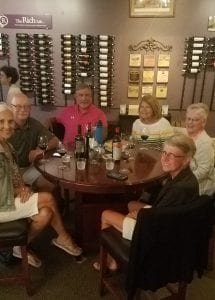
Patrons enjoying wine and music at The Grape Life.
The only other real gig Allen has played since places shut down in mid-March was one Sunday jazz brunch at Hotel Blackhawk early this month with the Josh Duffee quartet, where they wore masks. “Very few people were wearing masks; that was not comfortable for me,” Allen said.
Like many local musicians and artists, he’s performed often on Facebook and encouraged people to give virtual tips, which has been his only income source. He typically plays Wednesday nights at 8 p.m. and a “Sunday brunch” at 10:30 a.m.
“It’s such a double-edged sword,” Allen said, noting he’s not eligible for unemployment since he’s a self-employed independent contractor. “I’ve got to make a living, but I’m forced into doing things I may not feel comfortable doing.”
In March, after things shut down, the pianist said: “It’s very frightening; it seems surreal. As musicians, in certain tiers, we know we’re never gonna be wealthy people. We do this, I feel music kind of chose me. I’m fortunate, and I persevered. I’m blessed I can do this for a living and I stay busy and booked. So when it comes to a halt, it’s shocking.”
“It certainly could have been worse. I really am grateful,” he said recently. “I fear for folks who can’t get jobs or pay their rent or mortgage right now.”
A whole new world for performers, audiences
The global pandemic – which has caused over 150,000 U.S. deaths – has upended nearly every crevice of society, perhaps none more so than the gathering of patrons for live performance. Theaters, restaurants, bars and concert halls must adhere to health and safety requirements (which vary by state), including social distancing and capacity limits.
Earlier this week, Iowa was named in a new federal report among 21 states in “the red zone” for the Covid outbreak, meaning they had more than 100 new cases per 100,000 people in the past week. The report urged those state officials to impose more restrictions.
The number of positive cases in the Quad-Cities has doubled in the past month – from 1,406 on June 26 to nearly 3,000 July 29.
On Thursday, Iowa Gov. Kim Reynolds announced that restaurants and bars that fail to comply with the state’s social distancing requirements will now face fines and risk the chance of having their licenses/permits suspended and revoked. The emergency public health disaster proclamation orders establishments to create at least 6 feet of physical distance between each group or individual dining or drinking alone.
In addition, all patrons must have a seat at a table or bar, and establishments must limit patrons from congregating together closer than 6 feet.
Diane Koster of Grape Life (at 3402 Elmore Ave., Davenport) brought live music back the first weekend of June, when she was allowed to have 50-percent capacity, parties seated six feet apart, and sanitation recommendations from the CDC. While their capacity is 88, they’ve been keeping guests to under 30 for weekend music, and don’t require masks.
“We leave that up to each individual. We have masks available,” Koster said. “Right off the bat, we had some good activity. People were anxious to get back out again.”
“People don’t seem to be too concerned; they know we’re taking every precaution, being safe and sanitized,” she said, adding they decreased the performance time to two hours, and charge customers a $5 reservation fee, so they can assign seating.
While they were closed, they still did a robust pickup and delivery business. “People really wanted to support us and people were drinking a lot of wine,” Koster said, thrilled they can host music again.
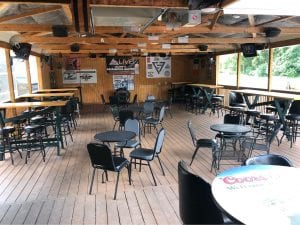
The Landing at Kavanaugh’s Hilltop Bar & Grill.
“We love our business — we probably enjoy the music as much as the customers do,” she said. “It’s good for everybody’s souls, good for the musicians to be there.”
Kavanaugh’s Hilltop Bar & Grill, 1228 30th St., Rock Island, restarted its live music on weekends in late June, on the open-air landing out back, and every Wednesday, they have an open blues jam at 6 p.m. There, people have to bring their own mics and cords, not sharing between artists, owner Tim Kavanaugh said.
The space has six feet between tables, no tables larger than eight people, and bands typically draw 30 to 50 people, he said. “It’s helping a lot; it gets people get out, they can still all fit together. Everybody has been pretty happy with it.”
“We’ve had pretty decent crowds from the beginning,” Kavanaugh said of live music. “We’ve had good crowds, people are excited to get back out, see people again, do a little bit of socializing.”
“I just think music helped bring people out, when there were no sports on.”
Gary Wethington of Rock Island, of the popular band Phyllis and the Sharks, is happy to be back out playing, including at Kavanaugh’s.
“We only play spaces that have good social distancing,” including Parkside Grill and Len Brown’s North Shore Inn in Moline, all outdoors, he said, noting Aug. 1 they’re at Brown’s on the Rock River. “It’s kind of weird. When you have grandchildren (he has six), as long as everybody takes precautions, I think we’ll be all right.
“It’s not like it used to be. I don’t think it ever will be how it used to be,” Wethington, 61, said. “So many people love live music; Phyllis and I have been playing 40 years. The music scene just took off two years ago, it hadn’t been like this in decades, and now we have Covid. I’m not complaining – a lot of people have things worse off.
“Everybody got so tired of being locked up,” he said. “Our first few jobs, it was like, holy crap. Now that we’re having a resurgence of Covid, we haven’t played in three or four weeks at Kavanaugh’s.” (Phyllis and one Shark were scheduled back there July 31.)
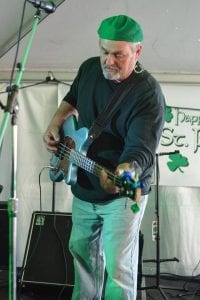
Gary Wethington plays for Phyllis and the Sharks.
“With bands, I don’t care what anybody says, we all want big crowds,” Wethington said. “One thing I can say about all three (music venues), they’re doing what they need to do to keep people safe. It’s crazy. I played acoustic, and a girl came up and wanted to hug Phyllis, and I said, you need to sit down.”
“People like to go out and hear live music. To see the looks on their faces, they really love it,” he said.
Kavanaugh is partners at the Hilltop with Scott Handcock, owner of O’Keefe’s Irish Pub at 1331 5th Ave., Moline, which also has weekend live music at its patio, and karaoke on Wednesday nights at 9 p.m.
A HIVE of musical activity
Donovan Gustofson of Davenport performed Friday night, July 31, in a duo outside at The Tangled Wood, 3636 Tanglewood Road, Bettendorf. “They have a great setup for music, they really do.”
He’s played there few times there (pre-Covid) as a member of Funktastic 5, and this weekend was the first time he got out to perform in months. On Thursday night, he played inside Kilkenny’s in downtown Davenport, and Saturday, Aug. 1, Funktastic 5 is playing outdoors at Grease Monkeys in Colona.
“There’s a little bit of trepidation, nervousness in performing, being in a bar, just in the midst of Covid,” Gustofson said. “It’s a little concerning, but I think most musicians are going stir crazy, not getting out and performing.”
The Gypsy Highway – which also has gotten back to regular live music — is indoors as well, 2606 W. Locust St., Davenport, owned by Virgil Richardson.
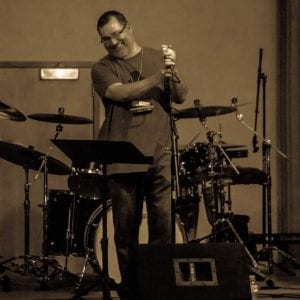
Donovan Gustofson of Funktastic 5 is the driving force behind QC HIVE.
“Gypsy Highway has been really great; they’re taking temperatures at the door,” Gustofson said. “I know they have sanitizing stations scattered throughout the whole bar. They’re even doing, they have a fog machine they use, putting disinfectant and shooting that out in the air on occasion as well, which I thought was an inventive step.”
“They’ve been really proactive, since they’re an indoor venue, to make it as safe as they can,” he said. “I’ve been most impressed with what they’ve been doing at Gypsy Highway compared to a lot of other clubs.”
Richardson resumed live music in early June with small acoustic acts, to test the waters and see if people would show up, then added amplified bands.
“We try to keep people safe,” he said this week, noting a sign in the bar encourages use of hand sanitizer. “One of the advantages we have, the venue as big as it is, we’re able to space our tables out.”
Crowds for weekend bands have been fairly small, and Gypsy Highway is proceeding on plans to build an outdoor covered pavilion by this fall, which will raise its capacity outside from about 55 to over 100, as a safer option for live music.
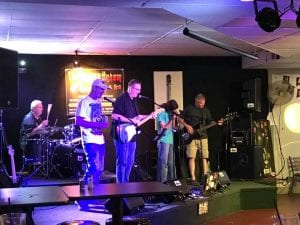
A band performing at Davenport’s Gypsy Highway.
“We’ve been wanting to do it for a while, but with all the things with the recent Covid increase, motivated us to do it this season versus later,” Richardson said. “For the most part, people understand the seriousness of things. We try to limit the amount of exposure (to the virus) people would get.”
He leaves customer mask wearing up to personal choice, while his staff usually wears masks.
“I think people are cautious; that’s the way you’ve got to be nowadays,” he said.
“I feel a little more comfortable with the outdoor shows versus the indoor shows,” Gustofson said, noting the risk of virus transmission is much less outside. “Most people do.”
Funktastic 5 will be playing at the Schwiebert Park concert series in Rock Island on Thursday, Aug. 13.
“I just hope when people come out, they’re wearing masks, have their hand sanitizer and are distancing,” he said. “Generally, they attract a lot of people to those, but that’s a big enough area, you can social distance pretty well.”

Ruby & Donovan performed at The Tangled Wood July 31.
“One thing I’d want to stress for people coming out, enjoying music again, is to take care of yourself, mask up, enjoy your music, socially distance if you can, and as much you want to come up and hug your musician friends you haven’t seen in a while, just give us an air high-five and we’ll get to hugging and saying hello when it’s a little safer to do.”
Having fun and being safe can be a tough balance – “I think we’re all just trying to do the best we can,” Gustofson said. “I hope people err more on the side of caution, because if we all just ignore the guidelines, we’re gonna be right back where we were, clubs were closed and we can’t play music again. That was rough.
“Mentally, I don’t know if I can go through that again,” he said. “I’m hoping everyone is as safe as they can be and we want everyone to come out and have a great time – be able to have a couple drinks, come out and see their friends, and hopefully mask up.”
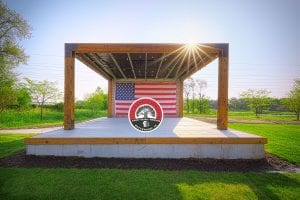
The outdoor stage at Bettendorf’s Tangled Wood.
“Everyone’s trying to figure it out as we go, like how do we do this?” Gustofson asked. “Funktastic, we’ve been talking it over and we’re trying to err on the side of caution, because out of the five members, three of us are in high-risk category of catching Covid, so we really want to be careful.” (He’s diabetic.)
He’s done a few outdoor private house parties and a couple Curbside Concerts through River Music Experience, Davenport.
Since late March, Gustofson has overseen QC HIVE (with over 6,800 members on Facebook), a daily charitable effort that’s raised over $53,000 for about 130 artists, businesses and venues. At least 40 percent of those are musicians, he said.
Looking forward to ‘Mo’ music
Maureen “Mo” Carter of Davenport is another Q-C music veteran who’s missed regular gigs. She plays solo, as a member of The Velies, and her new female-fronted Americana folk band, Mo & Co. She’s played a private house concert; has livestreamed from Bettendorf’s Crawford Brew Works, and has done three curbside concerts since April, in 30-minute sessions, available for a suggested $60 donation.
“Everyone in the neighborhood comes out; it’s been a really great experience,” Carter said recently. “It’s really important, giving local musicians an opportunity to play while venues are shut down. I don’t have a lot of opportunities to play anywhere. For RME, it continues their programming, and it’s also spreading the joy of music in the community.”
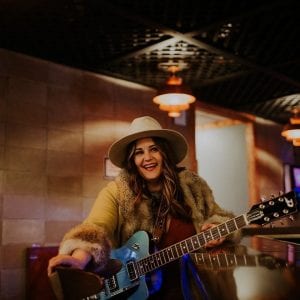
Maureen Carter will return with the Velies Aug. 28 at RME.
“As long as the weather is nice, the demand is there, they’ve been really popular,” she said of the informal curbside concerts. “I’ll take any opportunity to play in front of an audience.
“They all really enjoy it, they’re just happy to see live music, really grateful for it,” Carter said. “You don’t realize how much you miss something until you don’t have it anymore.”
She’s looking forward to reuniting with The Velies for an Aug. 28 free concert, in the revamped Live@Five at the RME courtyard, 129 Main St., Davenport. The series (postponed from June) is for all ages, from 5 p.m. to 7 p.m. each Friday in August and September. New guidelines will be enforced, to ensure safety of guests, staff and musicians –
- Face masks are required for entry and bar service. Guests will wear face masks when not seated and when not able to maintain six-foot distance from others.
- Seating will only be allowed in the boxes marked on the ground, which can seat up to 3-4 people in the same group. When seated, guests may remove their masks.
- Bring your own chairs! They will not be setting up chairs as in the past.
- Capacity will be limited to about 80 people total (compared to a past maximum capacity of 275). Entry will be first come, first served. When the space reaches capacity, no additional guests will be admitted unless other guests leave.
- A limited number of face masks will be available for guests that do not have one. Hand sanitizer stations will be provided.
- Some additional seating will be available on the Tacobar patio. (Food and beverage purchase may be required.)
“There aren’t a ton of places to play; I never thought I’d be saying that.” Carter said, noting they were supposed to play the Bettendorf Faye’s Field summer concert series, which was canceled, and were booked for Alternating Currents (a regional arts fest), the last weekend of August, which also was canceled.
She also planned to be performing this summer to promote her first CD with Mo & Co., which was recorded a year ago and got delayed in release.
“We’ve been in a holding pattern thinking what to do,” Carter said. “We really wanted to do a show, really bad. We’d love to get back into the studio, but we’re not generating income. We don’t have funds to record more music.”
Big auditorium, small crowd
A new socially-distanced concert will be Aug. 7 at 7:30 p.m. at Galvin Fine Arts Center, St. Ambrose University, Davenport, featuring Quad City Symphony concertmaster Naha Greenholtz and pianist Marian Lee. Music lovers have the option of paying $25 to be one of just 50 in the 1,175-seat auditorium or to watch a live-stream from the comfort of their home.
With a multiple high-definition camera setup, livestream viewers will get an up-close view of these two musicians at work, unlike anything they could experience at a traditional concert.
At Galvin, the concert is general admission, but attendees will be spread throughout the hall to ensure recommended social distancing. Entrance to the hall will be staggered to allow attendee groups to remain separated.
Masks will be required for entry, while waiting for entry, exit, and to move about the common areas. Masks are strongly recommended but not required when attendees are in their seats. Disposable masks will be available for those who arrive without one.

Violinist Naha Greenholtz, left, and pianist Marian Lee.
Tickets will not be sold on-site, and must be purchased in advance at qcso.org. Tickets will not be touched by the ticket scanners, and program booklets will only be available in a digital format. The program booklet will be available in advance online if attendees wish to print their own copies.
“Really the beauty of going livestream also is, there are people who maybe don’t live in the Quad-Cities and people who love the symphony and concerts, and have moved away, live elsewhere, but they can tune in,” said Lee, associate professor of music at Ambrose, noting the concert was originally scheduled for March at Augustana College.
“I’m excited personally, because I can have my family who haven’t been able to see my concerts, can see it live,” she said. “In some ways, it’s sort of a blessing, I guess.”
Given the nationwide protests over racial inequality, Lee wanted to perform a work by an African-American composer. The program includes a fantasy by Florence Price (1887-1953) for violin and piano, “I really thought was great,” she said. “She’s really the first African-American female composer to have her work performed by a major American orchestra.”
“I had never even heard of her, so it’s astounding there are all these, not just her, but other African-American composers that I never was exposed to, both at school in my classes, or in music history books. It was really eye-opening, so I’m really glad I found her.”
“I’m really grateful the Quad City Symphony has not given up on live performances,” Lee said of the Signature Series of chamber music. “We’re staying within what our governor says we can do, and thankfully, to Galvin Fine Arts Center, we’re able to have people actually come into our space, for this live performance.”
“We miss performing, quite honestly,” she said. “It’s been hard. Personally speaking, I haven’t been to a concert since February. It’s incredible I’ve not been able to go to anything live.”
“I’m really grateful we can have people come experience it live with it being safe,” she said. “To me, it’s all about being safe and comfortable. I’m very grateful we have this space to spread out, so that it’s even possible.”
QCSO music director Mark Russell Smith will introduce each piece, a role he doesn’t usually do for Signature Series. “I think people miss him,” Lee said. “The symphony didn’t get to do their April Masterworks, and the big ‘Star Wars’ event they were going to do. It’s such an incredible loss.”
The pianist hasn’t live-streamed her playing during quarantine, but recently finished teaching a virtual summer piano camp. “It worked out amazing, much better than I thought it would,” she said.
For their recital, students recorded from home, and she made a movie of them all, and watched it live together on Zoom. “That was really nice and worked out really well,” Lee said. “It’s a whole new world, having to adapt. I feel like I’m part of the 21st century now.”
A small Black Box opened up
The first Q-C indoor theater during the pandemic was the two-actor play, “The Turn of the Screw,” which opened July 16 for four performances at Black Box Theatre, 1623 5th Ave., Moline.
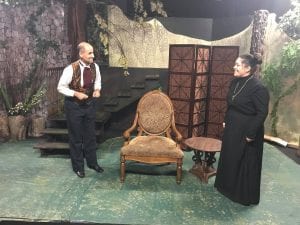
“The Turn of the Screw” at Black Box Theatre in mid-July.
“Our patrons were very happy to see live theatre again,” director and BBT co-owner Lora Adams said by e-mail, noting the average audience size was 11 (out of the 26 allowable seats for half capacity). “Many said they asked friends, but they were uncomfortable being around people.
“Our guests wore their masks for the entire show, and appeared grateful that the actors wore shields and commented they couldn’t even see the shields after a moment,” she said. “We are planning on a radio play for August, but I want to get the contract finalized before I say what it is.
“Our protocol was to sanitize the theatre, put up signs on the seats patrons could use to ensure social distancing,” Adams said. “We put our program ads and information up on boards as we did not want to hand out anything. Doors opened 15 minutes before curtain. Temperatures taken, sanitizer put in each guests hands. In the restroom, signage to use the disinfectant spray on anything they touched. I had no problems with people following our rules.”
Opening night included Sandy Glass in the audience. “Black Box was very safe and handled all protocols very well,” she said. “It was nice to something live after these hard few months.”
Speakeasy back with slate of shows
In mid-July, the Circa ’21 Speakeasy, 1818 3rd Ave., Rock Island, reopened by reducing its seating capacity from 130 to 50, with tables six feet apart and patrons required to have masks and take their temperature upon entry.
“That’s the policy for everything we’re doing now,” said Brett Hitchcock, director of audience development. “We’ve allowed the performers to remove masks and face shields, especially if they’re singing.”
“It’s been well-received,” he said of audiences. “What we’re finding, through people attending the shows, or reaching out through social media, people are ready to start seeing live entertainment again. As these Covid numbers are bouncing all over the place, there are some people still concerned about going out and being in public places with people.
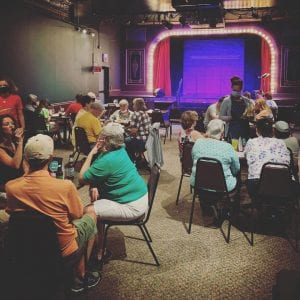
Patrons return to the Circa ’21 Speakeasy.
“We’ve also found that on the flip side, there are people that are ready,” Hitchcock said. “They’ve been cooped up, and while that’s the safe thing to do with this pandemic, they’re ready to have some sort of live entertainment, and try to get around people again. It’s up to the venues to make sure we’re doing that safely, following the CDC guidelines, or additional guidelines on the state level.”
“We’re doing everything we can to keep everybody safe – not only our guests, but the employees, the performers,” he said. “We are going above and beyond.”
They have started a show called Thursday Night Live, made up of Circa veterans and Bootleggers in a cabaret. Next week, they’re starting “Broadway Backwards,” based on a concept that started in New York in 2006, where performers gender-swap a hit show tune.
They have their regular Speakeasy shows back, in addition to the new cabaret-style performances that otherwise would be at Circa, which has not been able to reopen, Hitchcock said.
Circa plans to do another “Music on the Marquee” event, which was first June 21 outdoors, seating 140 people (which sold out within 24 hours). They may do another in August, Hitchcock said.
Fighting for funding nationally
Don’t expect Moline’s TaxSlayer Center to re-open anytime soon, but its executive director, Scott Mullen, is working behind the scenes to help support the live music industry nationwide.
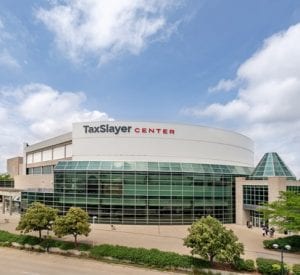
The TaxSlayer Center in Moline will be one of the last concert venues to reopen.
“Like so many other businesses, we have been devastated by the Covid-19 pandemic. We were among the first to close, and we will be among the last to re-open,” he said recently. “We face enormous challenges keeping our operation going with no revenue streams from events and to date we have not been included in any government relief funding, PPP or CARES Act legislation.
“There will also be an expensive price tag for Covid-19 related improvements like disinfecting and temperature monitoring equipment as well as converting to a touch-less experience throughout the building wherever possible, by converting to automatic sinks, flush valves, mobile concession ordering, etc.,” Mullen said of the 27-year-old arena.
He is director of arenas for the International Association of Venue Managers (IAVM), which with the National Independent Venue Association (NIVA) is strongly promoting the “Save Our Stages” Act in Congress. It seeks $10 billion in grants for live venue operators, promoters, producers and talent representatives, and recipients must have fewer than 500 full-time employees.
Mullen was asked to review and comment on the draft version of the act, noting there was ambiguity in the language regarding conditions to qualify for relief – specifically requiring “not less than 70 percent of the operations relate to live concerts, comedy shows, theatrical productions, or other events by performing artists.”
“The way I interpret this is that it could exclude arenas like ours because many of our dates are games played by our sports tenants,” he said. “These are in addition to all the other types of events and we shouldn’t be excluded for providing additional entertainment options. I’m hoping the language will be updated but have not heard anything back to date.”
Mullen also is part of lobbying efforts on behalf of IAVM and the TaxSlayer with Congressional representatives, in Covid-19 relief legislation, with the Q-C Chamber and Visit Quad Cities.
“While existing government assistance programs have helped other industries, they weren’t tailored to meet the needs of small businesses like ours that have zero revenue, enormous overhead and no visibility into when we can fully re-open,” Adam Hartke, co-chair of NIVA’s Advocacy Committee, said recently.
“The Save Our Stages Act will provide the assistance we need to get through the shutdown until we can reopen safely and once again become the economic generators for our communities that we’ve always been.”
A Chicago study last year showed that for every $1 spent on a ticket at a local venue, $12 of economic activity was generated for area businesses such as restaurants, retailers, and hotels.
According to a survey of NIVA members, 90% of independent venues said they will close permanently in a few months without federal funding. Pollstar has estimated a $9-billion loss in ticket sales alone — not counting food and beverage revenue — if venues remain closed through 2020.
Through SaveOurStages.com, more than 1 million emails have been sent to all 538 members of Congress. They asked legislators to provide federal assistance to independent venues and promoters.
Led by legislators of both parties, nearly 150 members of Congress sent letters to Mitch McConnell and Chuck Schumer in the Senate, and Nancy Pelosi and Kevin McCarthy in the House supporting NIVA’s requests.
“As for a re-opening date, nobody knows at this point,” said Mullen of the Moline arena. “It all depends on controlling the virus through a vaccine or treatment and the State of Illinois allowing us to open.
“When we do re-open, our priority is to make sure our employees and guests are safe and some Covid-19 relief assistance from our senators and representatives in Congress would really go a long way in that effort,” he said.









